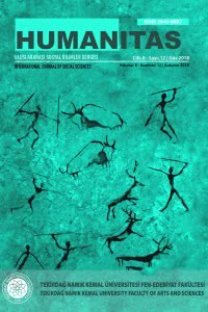İşyeri Sahiplerinin Perspektifinden Kentlerde Yayalaştırma Projelerini Etkileyen Faktörler: Erzincan Örneği
Günümüzde gelişen teknolojiyle beraber sayısı artan motorlu araçlar kent hayatını giderek olumsuz etkilemektedir. Bu soruna çözüm bulmak için yerel yönetimler yıllardır kent planlarında, trafik kurallarında ve ulaşım sistemlerinde birçok düzenlemeler yapmışlardır. Bunların en önemlilerinden birisi olan yayalaştırma, giderek daha fazla önem kazanmaktadır. Fakat, kentlerde yıllardan beri var olan yapısal düzeni değiştirmek çok kolay olmadığından yayalaştırmanın uygulanması da kolay değildir. Bu çalışmada yayalaştırma yaparken hangi faktörlerin göz önünde bulundurulması gerektiği incelenmiştir ve bu faktörlerden hangilerinin yayalaştırmanın yapıldığı bölgedeki işyeri sahiplerinin yayalaştırmaya verdiği desteği etkilediği ortaya çıkarılmıştır. Öncelikle yayalaştırmayla ilgili literatür taranmış ve farklı yayalaştırma türleri incelenmiştir. Buradan yola çıkılarak bir kuramsal çerçeve ve araştırma modeli oluşturulmuştur. Modeli test etmek üzere, Likert ölçeğiyle hazırlanmış bir anket kullanılmıştır. Anket odak (focal) örneklem metoduyla seçilen 161 katılımcıya uygulanmıştır. Test edilen toplam 6 hipotezden 3'ü kabul edilirken, 3'ü kabul edilmemiştir. Daha önce yayalaştırmayla ilgili yapılan araştırmalar incelendiğinde, çevresel gelişmişliği yeterli düzeyde olan bölgelerdeki yerel yönetimlerin, yayalaştırma uygulamasını en fazla yapan yerler olduğu görülmektedir. Bu doğrultuda çevresel gelişmişliğe olan inanç arttıkça, yayalaştırmaya verilen desteğin de artacağı düşünülmekteydi. Fakat bu çalışmada işyeri sahiplerinin, bulundukları bölgenin çevresel gelişmişlik açısından yeterli düzeyde olduğuna inandığı takdirde, tam zamanlı yayalaştırma uygulamasına destek vermediği ortaya konmuştur. Çalışma, kentlerde yayalaştırmayla ilgili yeni projeler yapılırken nelere dikkat edilmesi gerektiğini ortaya çıkarmıştır. Dolayısıyla bu uygulamayı yapacak yerel yöneticiler için de yön gösterici olması açısından önemlidir.
Anahtar Kelimeler:
Yerel Yönetimler, Yayalaştırma, Kentleşme, Yaya bölgesi
Factors Affecting the Pedestrianisation Projects in the Cities through Business Owners’ Perspectives: The Case of Erzincan
Today, increasing number of motor vehicles affect the urban life in a negative way. In order to find a solution to this problem, for years, many local authorities have been doing a lot of changes in their urban plans, traffic rules, and transportation system. The pedestrianisation, which is one of the most important among these efforts, has gradually become more important. However, as it is not so easy to change the existing stractural system of cities, pedestrianisation projects are regarded as difficult tasks to undertake. In this study, factors affecting the pedestrianisation projects were examined, and a model was developed. To test the model, a survey in likert scale was used. The survey was applied to 161 participants chosen with focal sampling method. 3 out of 6 hypotheses were accepted, and other 3 hypotheses were rejected. It is expected that local governments of cities, which is environmentally developed, are more inclined to undertake pedestrianisation projects. In the same vein, it is believed that the more locals are sensitive to the environment, the higher their support for such projects. Nonetheless, the results show about the business owners that when they find their city’s environmental development satisfactory, they do not support full pedestrianisation scheme. The study identifies what to consider in undertaking new pedestrianisation projects. Therefore, it is significant for local authorities.
Keywords:
Local Governments, Pedestrianisation, Urbanization, Pedestrian zone,
___
- Akbulut F. (2016). "Kentsel Ulaşım Hizmetlerinin Planlanması ve Yönetiminde Sürdürülebilir Politika Önerileri", Kastamonu Üniversitesi İktisadi ve İdari Bilimler Fakültesi Dergisi, Ocak 2016, Sayı:11, 337-355.
- Biyela T. (2000). The Application of Pedestrianisation and Traffic Calming to Curb Vehicle and Pedestrian Conflict in the Newcastle cbd. A Case Study of Scott Street, (Yüksek Lisans Tezi) University of Natal- Durban.
- Coşkun O. (2013). "Doğu Anadolu Bölgesi'nde Kentleşme ve Kentsel Gelişim", Doğu Coğrafya Dergisi, Cilt: 18, Sayı: 3, 229-256.
- Erzincan Belediyesi (2017). Erzincan'ın Coğrafyası, http://www.erzincan-bld.gov.tr/icerik/21/cografya.html (01.04.2017).
- Erzincan Valiliği (2017). Erzincan'ın Tarihi, http://www.erzincan.gov.tr/tarihce (01.04.2017).
- Iranmanesh, N. (2008). Pedestrianisation A Great Necessity In Urban Designing to Create A Sustainable City In Developing Countries, 44th Isocarp Congress.
- Kincl B. and Matos S. (2015). "Pedestrianisation and Parking Policy as a Solution towards Green Transport Plan: A Case Study of Zagreb", Journal of Civil Engineering and Architecture, 9, 1079-1084.
- Moosajee, N. (2009). An Investigation into the Pedestrianisation of City Streets: A move towards pedestrian friendly spaces and their economic effects in the City of Cape Town, (Doktora Tezi), Department of Civil Engineering Univesity of Cape Town, Güney Afrika.
- Sastre J. vd. (2013). Economic Impact of Pedestrianisation In Historic Urban Centre, The Valdemoro Case – Study (Spain), 2nd Conference of Transportation Research Group of India (2nd CTRG), Procedia - Social and Behavioral Sciences 104, 737 – 745.
- Schutt, R.K. (2004) Investigating the Social World: The Process and Practice of Research (4th ed.), Thousand Oaks: Sage Publication.
- Soni N. ve Soni N. (2016). "Benefits of Pedestrianization and Warrants to Pedestrianize an Area", Elsevier, 57, 139–150.
- Yocco, V. S., Heimlich, J. E., Meyer, E., & Edwards, P. (2009). Measuring public value: An instrument and an art museum case study. Visitor Studies, 12(2), 152-163.
- ISSN: 2147-088X
- Yayın Aralığı: Yılda 2 Sayı
- Başlangıç: 2013
- Yayıncı: Namık Kemal Üniversitesi
Sayıdaki Diğer Makaleler
Rıfat GÜNDAY (YABANCI DİLLER EĞİTİMİ), Fahriye ÇAKIR, Hasan ATMACA
ORTAÇAĞ TÜRK-İSLÂM DEVLETLERİNDE HÜKÜMDARIN ADALET SEMBOLÜ: Dîvânü’l-Mezâlim
ARAVİND ADİGA’NIN BEYAZ KAPLAN ROMANINDA SÖMÜRGECİLİK SONRASI HİNT TOPLUMU VE MADUN BİLİNCİ
JEAN BAUDRİLLARD’DA SİMÜLATİF DÜZENE BİR BAŞKALDIRI EYLEM OLARAK TERÖRİZM
SANAT TEMELLİ BİR SORUŞTURMA YÖNTEMİ: A/R/TOGRAFİ
Öteki ve Varlık: Freudo-Lacan’cı Politik Psikoloji Üzerinden Schmitt’i Yeniden Okumak
Onur Kemal BAZARKAYA, Burcu ÖZTÜRK
